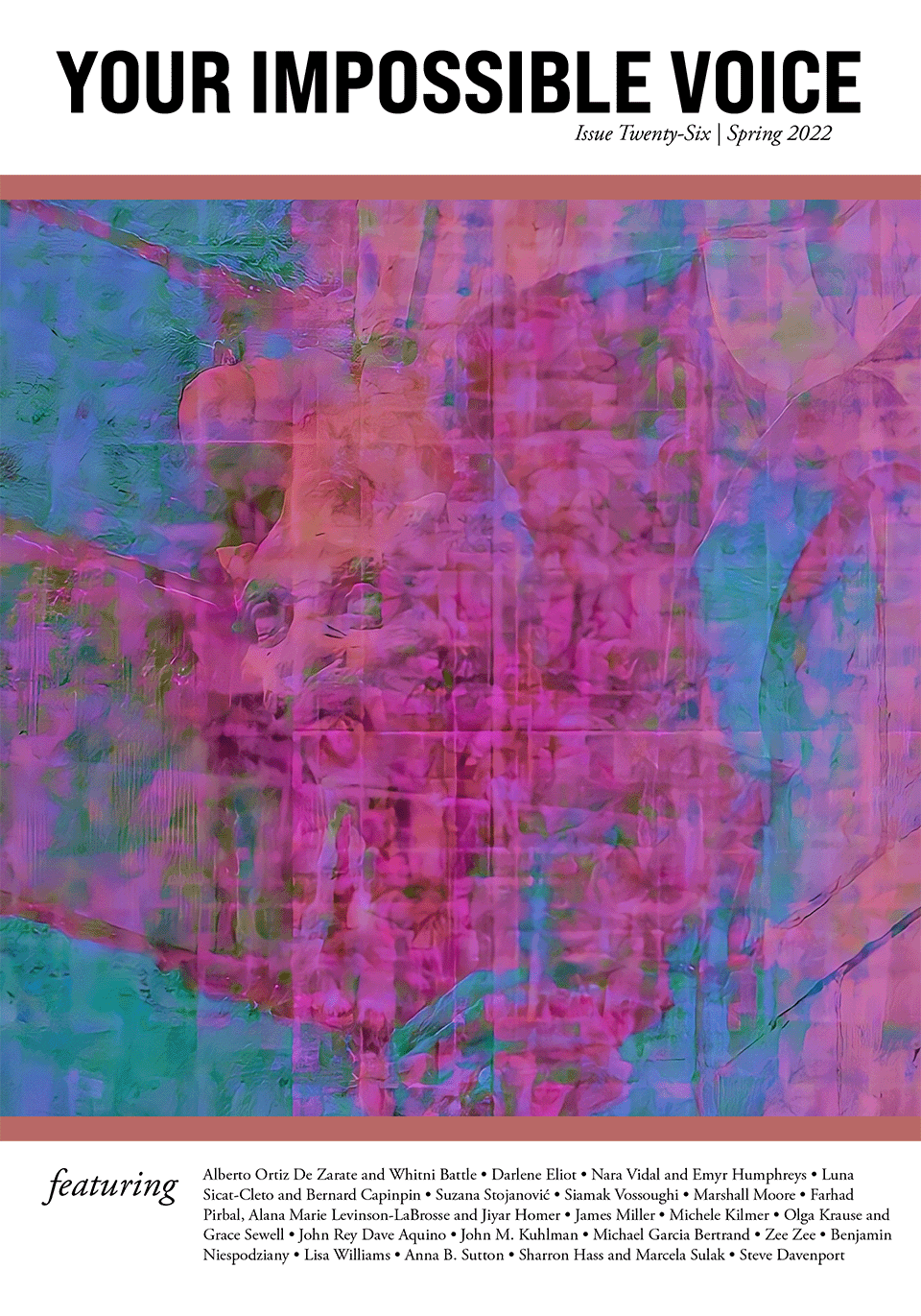Issue 26 | Spring 2022
Excerpt from Eva
Nara Vidal
Translated by Emyr Humphreys
— You know where the sheets are. They haven’t moved, they’ve always been there, in the cherry blossom wardrobe. You’re so picky about the fabric, so pick one from there. You know where they are, right? You’re home, no need to treat you like a visitor. Cherry blossom. You always thought it sounded nice, do you remember? You used to say how it sounded musical, how it sounded even nicer than mahogany. Mahogany sounded sad, cherry blossom sounded like a celebration. You always liked light wood. Your mother thought it wasn’t very sophisticated. The sheets and pillowcases, they’re all in the cherry blossom wardrobe in the bedroom. Choose the ones you want. Is your husband well? You’re all grown up. When’s the baby due?
It was vitally important I calm my father down. I betrayed the dismay in my eyes as I announced, yet again, that my mother was dead and that I had come home to a house that was hers forever. She continually died; my bed was unmade, the pillows were bare, and under the yellow quilt of crocheted buttercups was the bare, soiled mattress from the first seven years of my life. The same sheet always used to be prepared fresh and clean for me. My mother’s home now belonged to death. The floral sheets, folded just below the pillow, came to be a source of nostalgia, like the mothballs in the wardrobes, which I came to miss. With no made bed and no embroidered towel with my name and a butterfly on it, my father and I had become orphaned.
Dona Marli lived one street over from my grandmother’s house. There was a cardboard sign in front advertising the repair of broken stitches, zippers, buttons. However, her children’s essentials were paid for by the abortions she carried out with knitting needles, in the alleyway between her house and Our Lady of Aparecida, right beside the church.
Only poor girls entered the alleyway beside Dona Marli’s house. The ones who dined at pizzerias and were members of the local swimming club went to the abortion clinic, while the rest of the city believed those rich girls were having an operation for gastritis or tonsillitis. Many girls had died after being seen to by Dona Marli’s knitting needles. Poor girls.
The police had searched Dona Marli’s place once. But she was just a seamstress; she didn’t raise their suspicions. She replaced the glistening aluminum bowls with a colorful basket for the needles. The vast plantation of rue plants in her backyard didn’t raise any suspicions either. Only poor girls entered the alleyway.
People started calling her a criminal, a murderer. But the ones who shouted that on the streets or from the bars were those who had enough money not to need her. Disgraceful. The girl who worked at my uncle’s got pregnant by one of my cousins. Only poor girls entered the alleyway. To help her mother with the shopping, she would write off the milk, rice, and beans from the bill, but she also let him trap her in the maid’s storeroom. She was abused so regularly that one day she came out of there with a baby inside her. She told Dona Marli the story. She later died of an infection, and my uncle’s family secretly paid for the funeral. Dona Marli got away with it because she knew the father of the fetus she’d punctured until it disintegrated and ran down the dead girl’s slender legs. Only poor girls entered the alleyway. She snatched a glance up and down the street before pulling me inside by the back of my head.
She refused to help me at first, but I promised to pay extra. Enough to buy a pencil case with thirty-six colored pencils. She took hold of my hands, caressing my palms, and looked me right in the eye. Both of us were scared. Dona Marli’s frizzy hair cast a shadow on the wall that made me think of a crown of thorns.
She reached out her hand and guided me down the clay alleyway to her house on the far side of the courtyard. While I leafed through copies of Manequim, Dona Marli boiled water, carefully placing various needles in a glass on the table filled with alcohol together with cotton buds and rue plant leaves.
I drank a lot of tea, which alone should have been enough to kill a fetus, but just in case, I lay on the little table, slowly opened my legs, and passed out. Dona Marli turned my child into a blob of blood while I, out cold, didn’t feel much of anything. She was very quick, and when I came to, I threw up repeatedly. The smell of blood was overpowering. I smelled flowers, blood, death. I staggered home and before seven o’clock I was in bed, a little pool of blood turning into a lake with every spasm my body made. I was drowning. I was saved by my parents who took me to the hospital. Gastritis. That’s what they told the city.
Now I have company at the breakfast table. The doorbell rings, people take a seat. Women who have also lost their mothers. There’s only one cup on the table, mine. But the table is crowded. They talk quickly and they mess with my head. They’re all here. Sometimes it takes a long time for them to go away. Sometimes I have to be rude, to shout at them to leave me alone. When they’re not here, I sketch out labyrinths on a piece of paper. It’s my goal: to easily leave the labyrinth which I have created for myself. The lie I told myself. My ambition is not to come across these orphan women as I look for the way out. If I ever find out how to leave the labyrinth, I’ll tell them where the door is.
I get angrier and angrier at the women who now appear to be laughing at me. I reach for the cup and saucer from the table. As I take it, one of them grabs my wrist. It falls, an infernal racket, smashing to pieces. Blood on my fingertips and my wrists marked by the woman who grabbed me. Her nails are blue and purple with blood stagnation. I ask them to leave me alone, I even yell at them. They don’t hear me. I grapple with one of them, the one with pink and blue hands. I look for the window to throw her out of here, but the brown netting is thick, too difficult to break. I open the door and demand they leave my home. But they don’t listen. They ignore me as I slam my hands down on the table. I can’t get rid of them. The women are bald. They’ve got large eyes and no teeth. They don’t want to leave. My neighbor comes to the open door and asks if everything is okay. Of course everything is okay. You can never have any privacy these days. I close the door in her face. The women disappear. I go down to the flower shop for a coffee with the owners. My living room is noxious with the smell of flowers, breath, and toothless women.
About the Author
Nara Vidal was born in Minas Gerais, Brazil in 1974. Her fiction work includes short stories, novels and children’s literature. Her first novel Sorte won the Oceanos Award in 2019 and is translated into Dutch and Spanish. She works as editor of Capitolina Revista, for which has been awarded an APCA (Association of Art Critics of São Paulo Award). She is a columnist for the Culture Supplement at Tribuna de Minas and for Jornal Rascunho. Her book of short stories, Mapas Para Desaparecer, was shortlisted for the Jabuti Awards. Her latest novel Eva was published in Brazil in April 2022. She lives in the UK.
About the Translator
 Emyr Humphreys translates from Portuguese to English and from English to Welsh. He graduated from the research MA program in translation studies from University College London with a distinction in 2019. Since then, he has had translations published in Latin American Literature Today, The White Review, and Joyland Magazine, and his translations of texts by classic Brazilian writers such as Machado de Assis, Oswald de Andrade, and Júlia Lopes de Almeida are featured on the reading list for UCL’s fourth-year Portuguese program. He currently lives and works in mid-Wales.
Emyr Humphreys translates from Portuguese to English and from English to Welsh. He graduated from the research MA program in translation studies from University College London with a distinction in 2019. Since then, he has had translations published in Latin American Literature Today, The White Review, and Joyland Magazine, and his translations of texts by classic Brazilian writers such as Machado de Assis, Oswald de Andrade, and Júlia Lopes de Almeida are featured on the reading list for UCL’s fourth-year Portuguese program. He currently lives and works in mid-Wales.
Prose
The Golden Hops Alberto Ortiz De Zarate, translated by Whitni Battle
The Woman in the Murder House Darlene Eliot
Excerpt from Eva Nara Vidal, translated by Emyr Humphreys
Three Propositions of the White Wind Luna Sicat-Cleto, translated by Bernard Capinpin
Iron Cloud Suzana Stojanović
Buffalo Siamak Vossoughi
The First Ghost I Ever Saw Was Marshall Moore
The Lion Farhad Pirbal, translated by Alana Marie Levinson-LaBrosse and Jiyar Homer
The Good Man James Miller
The Teacher
Woodwork
My Wife Was Drunk at Hobby Lobby
Oranges; Charcoal Michele Kilmer
Ode to Zheka Olga Krause, translated by Grace Sewell
Padre de Familia John Rey Dave Aquino
Excerpt from Dictionary John M. Kuhlman
Gospel of Mary Michael Garcia Bertrand
Poetry
There are No Salvageable Parts Benjamin Niespodziany
Sunday in the Woods
You Is Not the Room Lisa Williams
I Cloud the Moon
Lost Creek Cave Anna B. Sutton
Excerpt from “Hehasnoname” Sharron Hass, translated by Marcela Sulak
Moon Talk Steve Davenport
The Son of a Bitch of Hope After

